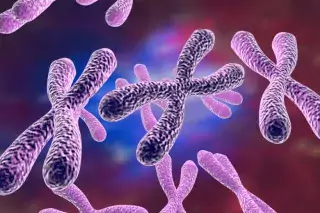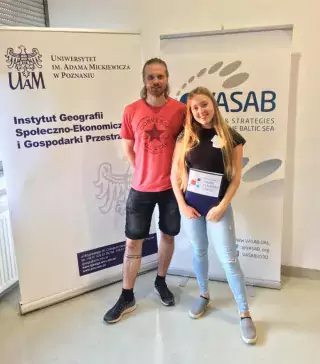News archive
On this page you can search for older news. Choose a topic, type of news or enter your own keyword to filter out news.
View compact

Children born to women who underwent gastric bypass surgery before becoming pregnant had a lower risk of major birth defects than children born to women who had severe obesity at the start of their pregnancy. That’s according to a matched cohort study by researchers at Karolinska Institutet and Örebro University published in the scientific journal JAMA. The findings indicate that weight-loss and improved blood sugar control could reduce the risk of major birth defects.
News
We become weaker as we get older. For those who suffer from severe muscle loss at an early age, the consequences in everyday life are often significant. Thomas Gustafsson is researching the causes of these changes and how they can be counteracted.
News

The winners of the Nobel Prize in Physiology or Medicine for 2019 have explained a vital ability – how cells adapt to the availability of oxygen. These discoveries have opened the door to new strategies for combating anaemia, cancer and many other diseases and are now being investigated further at institutions including Karolinska Institutet.
News
Chronic kidney disease often goes undetected until late stages, but is of great significance to individuals’ overall health. Juan Jesus Carrero uses clinical epidemiology to improve the identification and management of those afflicted with the disease.
News

Refugees who fled to Sweden were no more likely to die by suicide than migrants who moved to the country on their own terms, according to a study by researchers at Karolinska Institutet in Sweden and UCL in the U.K. However, the risk of suicide for both groups increased the longer they stayed in Sweden and was after 20 years almost on par with that of the native population. The study is published in The British Journal of Psychiatry.
News
A mobile app for postoperative follow-up care leads to better patient outcomes and lower healthcare costs. Ulrica Nilsson investigates how e-health solutions can improve perioperative care.
News
Mental disorders, such as depressive and anxiety disorders, can lead to long-term sick leave – but excessively prolonged sick leave can also aggravate the illness. Ellenor Mittendorfer-Rutz conducts research on the links between mental disorders and social insurance.
News
Johan Lundin is using mobile digital solutions and artificial intelligence to make diagnostics accessible, safe, and accurate in low-income countries. The tools he is developing can also reduce the workload of doctors and laboratory personnel in high-income countries.
News

Researcher at Karolinska Institutet have identified the first genetic link to CGRP signaling and cluster headache. CGRP is a neuropeptide that can trigger both migraines and cluster attacks and now several drugs are successfully launched that have CGRP or its receptor as their target. The results are published in a study in Cephalagia Report.
News
Uwe Tietge researches the function of cholesterol in the body. His aim is to map basic mechanisms of metabolism’s molecular regulation and to identify novel targets for innovative cardio- vascular disease treatments.
News
Exosomes are tiny particles secreted by cells. They are involved in important processes in the body and may have useful clinical applications, including improved cancer treatments. Susanne Gabrielsson is one of the veterans of this young field of research.
News
Congratulations to Lennart Ilke, senior adviser at Karolinska Institutet’s Property and Facilities Office! He now also has the distinction of having translated to Swedish one of the books by the Polish winner of the 2018 Nobel Prize in literature, Olga Tokarczuk.
News

Johan von Schreeb is appointed Professor of Global Disaster Medicine at the Department of Public Health Sciences, from 15 October 2019.
News

Professor Emeritus Gunnar Höglund, doctor and researcher, died on October 3, 2019, 88 years old. His importance in highlighting the importance of medical education research and its development is unmatched in the history of Karolinska Institutet.
News
DNA origami involves ways in which DNA can be used to build nanoscale constructions. Björn Högberg has improved this technique and uses it for both basic research and the development of clinical applications.
News
Keith Humphreys develops and uses statistical methods for epidemiological research. He has a special interest in breast cancer risk assessment and in the studying the effectiveness of mammography screening.
News
Marie Hasselberg conducts epidemiological research on various types of injuries, including traffic injuries. Her aim is to identify both causes and possible improvements. Much of her research takes place in low- and middle-income countries.
News
Living with chronic pain is challenging – not least because of the limited number of good treatments. Camilla Svensson is researching the mechanisms behind persistent pain in rheumatic diseases and how it can be tackled in new, more effective ways.
News

University of Washington in Seattle, USA, has decided a building under construction will be named after the late Karolinska Institutet-professor Hans Rosling. The center is mainly financed by the Bill and Melinda Gates foundation, and is expected to be finished in 2020.
News

Two research projects at Karolinska Institutet have been awarded synergy grants from the European Research Council (ERC). In total, the researchers and their international partners were awarded about EUR 19 million (SEK 209 million) over a six-year period for studies that aim to widen our understanding of disease-causing fat cells and unlock new cancer treatments.
News
Erik Melén conducts research on the causes of allergies, asthma, and other paediatric lung problems as well as the factors that influence disease progression over time. His goal is to develop knowledge and treatments for better lung health over a person’s lifetime.
News

Altogether SEK 170 million. This is this year's allocation from the European Commission under the funding programme for health in Horizon2020. A total of 20 research projects at Karolinska Institutet are being supported, three of them also coordinated from here: a survey of what we are exposed to in the environment; mapping of the brain's different nerve cells; and a project to bring down the mortality rate in childbirth in four African countries.
News
Charlotte Ytterberg, Susanne Guidetti and Staffan Josephsson will receive grants.
News

Laura Crucianelli, researcher at the Department of Neuroscience, tells us about the "autonome sensory meridian response" (asmr) in podcast Medicinvetarna #24.
News

People with low scores on intelligence tests in adolescence run a higher risk of suicide and suicide attempt later in life. That is according to a study from Karolinska Institutet in Sweden that followed almost 50,000 Swedish men from the 1970s until recently. The study is published in the journal Psychological Medicine.
News

Associate Professor Annika Vänje is the newly appointed research leader for a research and collaboration programme aimed at combating sexual harassment within academia which was started this past spring. She is now starting her work, aimed at creating a better work and study environment and, by extension, higher quality in the university’s research and education.
News
Hi Stina Ek, PhD-student at the Division of Aging Research Center. On October 25th you will defend your thesis ”Predictors and consequences of injurious falls among older adults : a holistic approach”, what's the main focus of the thesis?
News

Correction: The article “Reduction in Mental Health Treatment Utilization Among Transgender Individuals After Gender-Affirming Surgeries: A Total Population Study,” published in The American Journal of Psychiatry on Oct. 4, 2019, has been corrected following a review of the statistical methodology and some of its conclusions.
News

The Nobel Assembly at Karolinska Institutet has today decided to award the 2019 Nobel Prize in Physiology or Medicine jointly to William G. Kaelin Jr, Sir Peter J. Ratcliffe and Gregg L. Semenza for their discoveries of how cells sense and adapt to oxygen availability.
News
Atopic dermatitis and psoriasis affect more than 300 million people worldwide and are highly variable in terms of onset, severity, progression over time and response to treatment. BIOMAP will examine the causes and mechanisms of these conditions by identifying the biomarkers responsible for the variation in disease outcome.
News

Researchers at Karolinska Institutet in Sweden have uncovered a chromosome-wide mechanism that keeps the gene expression of sex chromosomes in balance in our cells. The findings shed light on molecular reasons for early miscarriage and could be important for the emerging field of regenerative medicine. The study is published in Nature Structural and Molecular Biology.
News
Wenjing Tao from the group Upper GI Surgery will defend her thesis "Cancer after bariatric surgery : risk and prognosis" on October 4th, 2019. Main Supervisor is Professor Jesper Lagergren.
News
The Swedish Magazine Fokus has ranked Henrik Ehrsson, from the Department of Neuroscience, as number 9 out of the 100 most prolific and quoted researchers in Sweden in the area of Medicine & Life Science.
News

Four research projects at Karolinska Institutet receive funding from the Knut and Alice Wallenberg Foundation (KAW) in the project call of 2019. In all, researchers at KI are awarded close to SEK 135 million over a five-year period for studies into MS, mitochondrial disease, and vaccine against rheumatism.
News

Researchers have developed a new variant of the gene editing technique CRISPR-Cas9 that has the potential to increase precision during gene therapy in humans. The new variant reduced unintended changes in DNA compared to its wildtype, suggesting it could play a role in gene therapies that require high precision. The study by researchers from Karolinska Institutet’s Ming Wai Lau Centre of Reparative Medicine in Hong Kong is published in the journal PNAS.
News
A new way of producing nanoparticles that can function as carriers in so-called mRNA vaccines has been developed by researchers at the Hong Kong node of Karolinska Institutet – the Ming Wai Lau Centre for Reparative Medicine – and the MIT, USA. Using the method, which is described in the scientific journal Nature Biotechnology, the researchers have identified a new class of carrier molecules that inhibit tumour growth and prolong survival in mouse models of cancer.
News
Over 100 representatives from the Swedish life science sector participated in the hearing, whose main purpose was to gather thoughts and input for the SciLifeLab’s road map for the next decade.
News

At Karolinska Institutet several staff and students are deeply committed to reduce the environmental footprint. One of the many departments at KI taking an active approach to climate issues is the Department of Clinical Neuroscience.
News

While blood samples can reliably identify people with a low risk of developing severe liver disease, better methods are needed in primary care for identifying people in most need of care. These are some of the conclusions of a large registry-based study by researchers at Karolinska Institutet published in the esteemed journal Gastroenterology.
News

Researchers at Karolinska Institutet have taken part in the largest study to date on the genetic risk factors for multiple sclerosis (MS). The study, which is published today in the journal Science, corroborates earlier studies and provides new clues as to what causes this neurological disease. The resulting map will prove a vital resource for future researchers and could one day lead to new, more potent drugs.
News

The partnership between KI and the Mayo Clinic in the US is celebrating its 25th year. Since inception, the collaboration has supported a great many successful research projects and innovations. Sophie Erhardt has recently been appointed as KI’s academic coordinator for the collaborative platform.
News

Two recently graduated students from KI’s Global Master’s Programme in Nutrition Science were among the top 3 teams competing in the Baltic Sea Young Planner’s Contest in Poland. One of them was in the winning team.
News
Gonçalo Castelo-Branco is awarded the Anniversary Prize for influencing and inspiring international research on brain development, glial cells and multiple sclerosis. The prize includes an award of SEK 5 million and will be presented in conjunction with the Swedish Society for Medical Research’s 100th anniversary celebration.
News
Title: The comorbidity between attention-deficit/hyperactivity disorder and other neurodevelopmental disorders: aetiology, treatment and outcomes
News

People – or more specifically just Swedes – are more like chimpanzees than previously known. This is indicated in a genetic mapping of one thousand Swedish individuals, where new DNA sequences that should be included in the reference genome have been identified. The study is published in the scientific journal Molecular Biology and Evolution.
News
Three grants, of in total 37 MSEK, have been awarded to Karolinska Institutet towards a doctoral programme grant within register-based research and two research environment grants within register-based research. The Swedish Reserach Council awarded in total grants to an amount of 102 MSEK for 2020-2023.
News
Hi there Kevin Baker, doctoral student at the Department of Public Health Sciences at Karolinska Institutet. Today Friday 20 September you will defend your thesis. Tell us, what is the main focus of your thesis?
News
Professor Claes Frostell has been named scientific representative at KI for a period of two years starting September 1, 2019.
News

The timing of anemia—a common condition in late pregnancy—can make a big difference for the developing fetus, according to research at Karolinska Institutet published in JAMA Psychiatry. The researchers found a link between early anemia and increased risk of autism, ADHD and intellectual disability in the child. Anemia discovered toward the end of pregnancy did not have the same correlation. The findings underscore the importance of early screening for iron status and nutritional counselling.
News

Drivers, factory workers, and cleaners are three times more likely to develop type 2 diabetes than teachers and physiotherapists. Researchers at Karolinska Institutet in Sweden have studied how the occurrence of diabetes differs between occupations in Sweden. The results are being published in the scientific journal Diabetologia and are also presented at the European diabetes conference in Barcelona in September.
News
